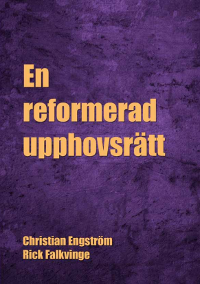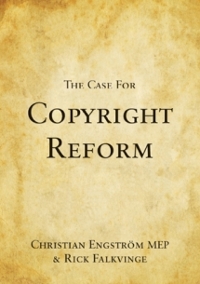
Elisabeth Niggemann, German National Library
Elisabeth Niggemann is Director General of the German National Library, as well as chairman of the foundation behind the Europeana project. She was one at the speakers on the hearing on orphan works that the European Parliament’s legal affairs committee JURI organized on November 10, 2009.
She had very interesting things to say on the subject of orphan works, and the problems that our current copyright legislation create for libraries that want to make their collections available in the digital age.
I think we should listen very closely to what librarians have to say on these matters. Public libraries have several hundred years of experience of doing exactly what we want to do now: to preserve our common cultural heritage, and to make it available to researchers, teachers, students, creators, and the general public. The perspective that librarians, archivists, and museum curators bring to the table is a valuable one.
In connection with the hearing in JURI, Ms. Niggemann also presented the views of Europana and the German National Library in a short paper titled How to deal with Orphan Works in the digital world. It is well worth reading in its entirety, but I will summarize it by giving some quotes from it here.
Ms. Niggemann of Europana and the German National Library writes:
Today’s users are already – and future users will be even more – used to finding everything on the internet. “If it’s not on the Web, it doesn’t exist at all” is their credo and especially librarians have already experienced the consequences of this attitude.
What is on the Web is the material that is published and distributed in electronic form as born digital works by commercial publishers and other publishing bodies or individuals. What is also slowly getting on the Web is the digitised cultural heritage. The digitisation progress is slow because there is little extra money in cultural institutions for digitisation. There is Google of course, digitising big libraries. But all in all progress is slow and only brings out-of-copyright material to the Web. If there are exceptions to this rule, they are either disputed – as is the Google example – or they are highly time consuming and therefore extremely expensive, because of the necessary rights clearance procedures that have to be worked through before digitisation.
More often than not, the rights clearance is more expensive than the actual digitisation. And very often clearing the rights is even not possible – or at least not possible within an economically justifiable approach. For a mass digitisation approach the original rights holders or their heirs or other transferees are practically speaking unlocatable. This is, as we all know, where we begin to talk about orphan works.
Depending on the definition of “orphan works” and depending on the practical meaning of “diligent search”, the percentage of expected orphan works among in-copyright works and the costs to prove that they really are orphan works will vary greatly. Variations in costs and in percentage are also significant depending on the country of origin of the work on the one side and depending on the cultural sector on the other side: rights clearance for books is different from rights clearance for music recordings, films or photographs, for instance, and some countries have a better infrastructure for rights clearance than others.
Taking all together, what we see is a “black hole of the 20th century” in digital libraries. There are the recent, born digital works, that are offered by publishers and domain specific distributors or that can be found in repositories of research facilities and cultural institutions and there are the historical cultural heritage works, digitised from out-of copyright physical copies from the shelves and holdings of cultural institutions. Between these two worlds of content, there is a vast empty space that will lead to a digital amnesia of most works from the 20th century – if no action is taken to fill the “black hole”.
Ms. Niggemann then describes in some detail how complicated and expensive it is to clear the rights for digitizing a work under current copyright regime, giving the situation in Germany as an example. She continues:
There is absolutely a need for a European-wide solution. A European-wide solution is actually only a first step. Digital libraries within national or even EU-borders are not realistic because there will always be ways to get access across borders within the Web.
…
Legal certainty across Europe is required to provide a strong basis for libraries to digitise orphan works. It is necessary to introduce clarity around the digital nature of library exceptions. In order to achieve legal certainty for all stakeholders, these exceptions must be legally binding in all Member States.
The pending settlement between Google and the AAP clearly shows what kind of situation can arise: Large quantities of out-of-print works of European origin that are in-copyright in the EU, but out-of-copyright in the US, are being digitised and made available in the US only. Such an imbalance in access to historical and cultural information needs to be urgently addressed by the EU, in part, through exceptions to copyright law.
At this point I would like to quote from the CENL (Conference of European National Libraries) statement on the Green Paper – Copyright in the Knowledge Economy (2008):
“Clarification in law is the role of the legislator and should not be left to interested parties to negotiate as it is the prime role of government to arbitrate where the balance in copyright should lie. Only legislation can guarantee that the interests of the creator are balanced with the public interest, for the good of wider society. It is not acceptable that vital issues such as the flow of knowledge in the information society are simply left to the vagaries of soft law or private negotiation.”
…
“These questions relate to the role of libraries in the digital world. … as repositories of human knowledge, in a society where information is becoming synonymous with economic growth, the role of libraries in the digital world must be strongly supported. Given the large public financial investment in libraries, it is not acceptable that the role of a library as the prime source of aggregated scholarly information is undermined by incomplete and piecemeal legislation.”
With respect to orphan works, CENL’s recommendation was: “Legal certainty across Europe is required to provide a strong basis for libraries to digitise Orphan Works.”
And, to end on a personal note, I think that a modern copyright framework which applies to the new digital world is urgently needed. It is crucial that this modern framework considers the different demands of each stakeholder. To start with orphan works and the need of bringing them out of the “dark” into the open, of making them available to a wide public via the Web, would be an excellent beginning.
Well said, says I.
…………
Andra som skriver om Orphan Works och digitalisering: SvD, Bokens framtid, Oscar Swartz, DN, Svensson, En annan sida, Anders S Lindbäck, Niklas noterar, Niklas noterar
Andra bloggar om: piratpartiet, eu, politik, informationspolitik
 Christian Engström, former Member of the European Parliament 2009-2014 for Piratpartiet, Sweden
Christian Engström, former Member of the European Parliament 2009-2014 for Piratpartiet, Sweden




Hello !
Digged on :http://digg.com/political_opinion/A_librarians_views_on_orphan_works_Christian_Engstrom
My Digg history: http://digg.com/users/sunurb01/history
Regards, Urban
Kommentar av Urban Sundström — 20 november 2009 @ 16:24
Hello !
Digged on: http://digg.com/political_opinion/A_librarians_views_on_orphan_works_Christian_Engstrom
My Digg history: http://digg.com/users/sunurb01/history
Regards, Urban
(link bad on last entry) please delete)
Kommentar av Urban Sundström — 20 november 2009 @ 16:25
Interesting. Librarians and others with similar roles should definitely have a greater say in these matters.
Btw. a bit OT, but here are two reading tips concering the (non-)transparency of the ACTA negotiations and recent rumours that this would be normal: Michael Geist, Techdirt
Kommentar av Tor — 20 november 2009 @ 20:46
[…] nyckelingrediens i detta var att Piratpartiet fick igenom sina upphovsrättsreformer om bland annat orphaned works under sitt riksdagsmandat […]
Pingback av Framtidsvision « OlofB[eta] — 30 januari 2010 @ 13:00
I do consider all the ideas you’ve offered for your post. They’re really convincing and will definitely work. Nonetheless, the posts are very brief for novices. May just you please lengthen them a little from next time? Thanks for the post.
Kommentar av Laurence Cassase — 22 juni 2012 @ 7:31